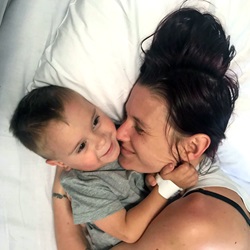Taking a toll – how focus on parental stress can benefit children with chronic conditions

Brooke Somner with her son Brax
A multidisciplinary team based at Perth Children’s Hospital (PCH) has published research highlighting how easing parental stress can improve the health outcomes of children with a chronic condition.
The research, funded by the Perth Children’s Hospital Foundation, is the first of its kind in WA to document the enormous burden on parents and carers of children with a chronic condition.
Former Professor of Nursing at PCH and Edith Cowan University Evalotte Morelius, who co-authored the paper published in Frontiers in Pediatrics, said the research highlights the value in adopting a child and family centred care approach in nursing.
“The parents we interviewed told us this was the most effective model of care to empower, educate and trust them to provide the best possible support for their child,” Professor Morelius said.
The research findings encourage health care professionals to look beyond a child’s health and consider other factors that may predict the progression of their illness or their frequency of hospital visit.
“Our research provides evidence for health professionals to broaden the scope of their focus within the hospital and consider what they can do to support parents who voice concerns about the stress of managing their child’s chronic condition.
“We found healthcare professionals, parents and patients all stand to benefit by improving the communication regarding support for parents,” Professor Morelius said.
“Fundamentally it’s about supporting nursing care, by amplifying parents’ voices to discuss care at home, and empowering parents to more confidently manage the challenges of caring for their child with a chronic condition.”
The research team is now building on this work by trialling a ‘distress thermometer’ to measure the ‘temperature’ of parents and carers and consider what pathways can be offered to support their stress.
Brooke Somner is mum of 8-year-old Brax who has diagnosed with VACTERL association as a baby. This disorder affects multiple parts of the body including vertebral defects, cardiac defects, renal anomalies and limb abnormalities.
Brax has seen a huge range of medical staff over his lifetime and has undergone more than 40 surgical procedures at PCH including a kidney transplant from his mum at just 3 years of age to treat end-stage renal failure.
“Consulting many medical staff across different departments can be overwhelming, especially in the beginning. It’s such a massive learning curve and it has been ridiculously hard at times, especially coping at home, but I’ve been well supported by services like the amazing ‘hospital in the home’ team.
“Good communication with your medical teams is critical because everyone has different needs so it’s so important for clinical staff to understand the stress and issues for different families,” Ms Somner said.
Ms Somner said she is extremely grateful to Brax’s renal team, who have become like family over the years. However, she has met many parents who haven’t shared the same experience.
“I welcome any research like this that raises awareness of the challenges families face in caring for a child with a chronic condition and questions if better support can be offered by health professionals,” Ms Somner said.
Carrie Clark, Kalparrin Chief Executive Officer and a co-author on this paper said she wanted to contribute to this research to better understand the lived experiences of parents supported by Kalparrin,
“Our hope is the insights provided by this research will help prevent carer burnout which is a very real problem for the families we support,” she said.
The research team included researchers from Edith Cowan University, Curtin University, PCH nursing research, Kalparrin and a consumer representative.
Support for parents can be accessed through Kalparrin.